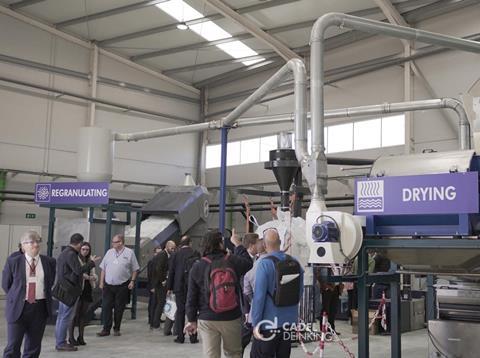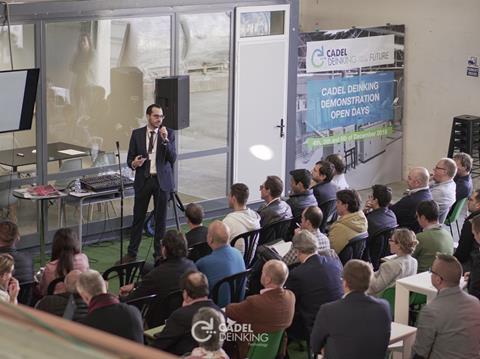
Libby White spoke to Pablo Cartagena, Business Development Manager, Cadel Deinking, about the value and potential of deinking technology.
‘Deinking’ is a water-based technology that converts printed scrap, flexible or rigid, into new valuable pellets.
LW: Can you please explain deinking technology, and why you saw a need for this process?
PC: The idea originated in Gaviplas, a plastic converter, because they saw good plastic wasted and wanted to do something to solve this problem.
‘Deinking’ is a water-based technology, with no solvents or degasification involved. It converts printed scrap, flexible or rigid, into new valuable pellets (PE, PP, PET, etc.). Most inks, on the surface, and resins can be removed, and odours too.
The deinked plastics keep the same characteristics as new raw material, so they are upgraded and can be used and printed again.
The recycled plastics without the deinking offer a poorer quality due to the pigments the plastics contains, so they are downgraded.
The system Cadel Deinking provides reuses the water and biodegradable chemicals in a closed circuit, so consumptions are low and environmentally friendly.
Gaviplas has now patented a film made with a percentage of their deinked plastics at Cadel.
How far does this technology bring innovation forward and what was the existing technological landscape before this? Essentially what is the breakthrough?
The printed waste generated in plastic manufacturing and accumulated in old factory stock was used to make low quality products, or for incineration.
When Deinking plastics, their properties are maintained and the recycled pellets are good enough to substitute virgin plastic.
It transforms waste into raw material to make packaging of the same quality. If used by the same converters it also saves all the cost of waste transport, and all the shipping needed to bring in the same quality of raw material.

How has your technology been accepted by the industry?
We had an Open House, in collaboration with EREMA, in December 2018 at our facilities in San Vicente de Raspeig.
Almost all of our visitors agreed about the need to reuse plastics. Deinking is a great step in the right direction.
This event demonstrated the operation of a plant with a deinking capacity of 450 kg/hour, allowing visitors to understand the Deinking process.
When the plant started up, the visitors were able to witness the treatment of plastics on site, and observe the whole process, from the supply of scrap material at the beginning to the final production of deinked plastic pellets.
Speakers were invited to explain the concept of the Circular Economy and the practical applications of deinked plastic, and the event was illustrated with presentations from DowDuPont, Ceflex project, Impact Recycling and Repsol.
What are the main benefits and reasons to implement this process?
If the recycled plastics do not have any printing on them they have the same quality as deinked plastics. The advantage is that all the surface-printed plastics can also be recycled and achieve the same quality.
The deinked plastics can be used several times.
It also opens an opportunity to treat post-consumer plastics, as it can also eliminate odours.
What chemicals are potentially present in the plastic and what happens to these during the process and to the resulting sludge?
Deinking is a closed circuit. The pigments are taken out, so the same water can be used many times.
These pigments, normally less than one per cent of the total plastic content, must be collected, but it is not hazardous material.
What are the practical applications of deinked plastic? Is it food contact safe?
The deinked plastics can be used to make films, bags, containers or furniture, to name but a few options.
We have run several tests on food contact, with positive results: one test was run by EFSA, based on European norms, and the other was run by FDA, based on the relevant American rules.
Can it be implemented on a wide scale- and what are the next steps?
We have an industrial deinking plant in Alicante, and another plant is going to be set up by a client in Italy.
The next steps are to close contracts that are being negotiated and install more plants.













